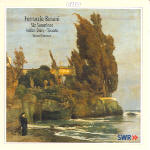With this release Busoni’s Six Sonatinas receive their finest recorded sound to date. You hear a beautifully regulated piano that is reproduced with just the right blend of clarity, warmth, and resonance. For the most part Roland Pöntinen offers gentler, more rounded and yielding interpretations than Paul Jacobs’ leaner, more incisive traversals. The most cogent example of this occurs in the Sonatina Ad usum infantis, where Pöntinen softens the polonaise rhythms so that they sound convincingly wistful and reflective. In the Fourth Sonatina’s central section he achieves ravishing pedal effects that magically illuminate Busoni’s quasi-impressionist harmonic vocabulary. Pöntinen’s lyrical transparency in the Second Sonatina’s madcap, polytonal figurations provide a convincing foil to Jacobs’ assertive dynamism.
It took me several hearings to appreciate the leisurely elegance Pöntinen brings to the Sixth Sonatina (the “Carmen Fantasy”), although he’s too cautious with the right hand filigree embroidering the “Habañera” section, and lulls the “fate” coda to sleep. In other words, don’t expect the demonic intensity and transcendental sweep of the old Egon Petri, Claudio Arrau, and Michael von Zadora versions on 78s (thankfully available on CD). The four studies that make up Busoni’s Indian Diary, however, are played with the utmost assurance and perception, from the sparkling high register passages in Song of Victory to the Bluebird Song’s eloquent simplicity. Lastly, the three-movement Toccata stands out for Pöntinen’s crisply delineated fingerwork in the Preludio, although the Ciacona could stand a little more oomph in the bass lines and more urgency and abandon in the climactic sections. All things considered, Busoni fanciers certainly will warm to Pöntinen’s finest moments.
































